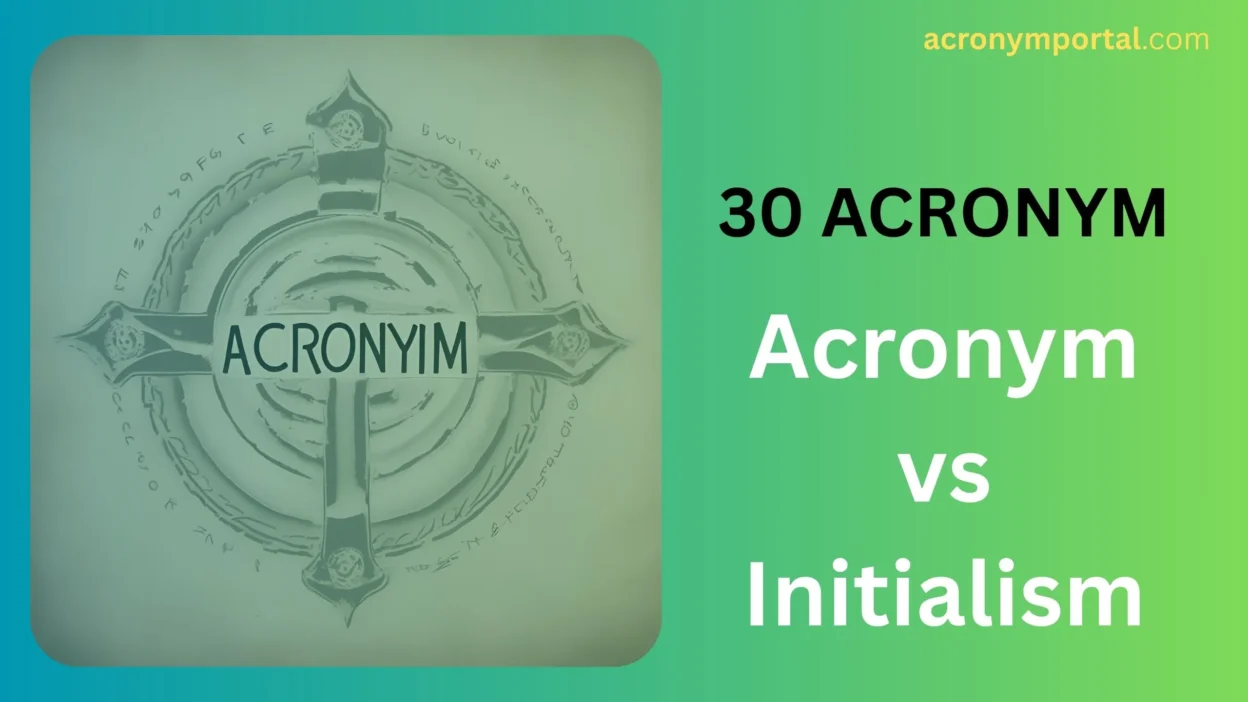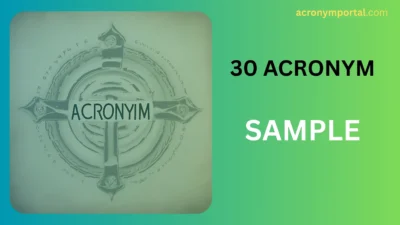When diving into the world of abbreviations, two terms often come up: acronym and initialism. While they may seem interchangeable at first glance, they actually represent different ways of shortening phrases or names.
Understanding the subtle distinction between these two can help you communicate more clearly and choose your words precisely.
At its core, a GPS acronym stands for “Gentle, Private, Subtle” traits, but here we’re focusing on linguistic nuances — specifically, how acronyms and initialisms differ and what alternatives exist for explaining or referring to them. Both are types of abbreviations formed from initial letters, but how you say them matters.
In this article, we’ll explore 30 alternatives and related terms around “acronym vs initialism,” explaining each one briefly with example sentences and advice on when to use them. This will expand your vocabulary and give you confidence when writing or talking about abbreviations.
📚 What’s the Difference?
- Acronym: A word formed from the initial letters of other words, pronounced as a single word (e.g., NASA, UNESCO).
- Initialism: A set of initials pronounced letter by letter (e.g., FBI, ATM).
Now, let’s explore related terms and nuances!
🔠 30 Alternatives and Related Terms for Acronym vs Initialism
1. Abbreviation
Meaning: A shortened form of a word or phrase.
Example: “Dr.” is an abbreviation of “Doctor.”
When to use: General term for any shortened form.
2. Mnemonic
Meaning: A memory aid, often using initials.
Example: “ROYGBIV” helps remember rainbow colors.
When to use: When the abbreviation is designed to help recall information.
3. Portmanteau
Meaning: A blend of parts of two words (e.g., “brunch” from “breakfast” + “lunch”).
Example: “Smog” is a portmanteau of “smoke” and “fog.”
When to use: When two words combine into one new word.
4. Contraction
Meaning: Shortening a word by omitting letters (e.g., “don’t” from “do not”).
Example: “Can’t” is a contraction of “cannot.”
When to use: When letters inside a word are omitted.
5. Initialism
Meaning: An abbreviation pronounced letter by letter.
Example: “CPU” stands for “Central Processing Unit.”
When to use: When pronunciation is spelled out.
6. Acronym
Meaning: An abbreviation pronounced as a word.
Example: “Laser” stands for “Light Amplification by Stimulated Emission of Radiation.”
When to use: When abbreviation forms a pronounceable word.
7. Clipping
Meaning: Shortening a word by cutting off part of it (e.g., “ad” from “advertisement”).
Example: “Vet” is a clipping of “veterinarian.”
When to use: For informal or casual speech.
8. Initials
Meaning: The first letters of words, usually used as a shortened form.
Example: “JFK” refers to John F. Kennedy.
When to use: When referring to someone’s initials or formal acronyms.
9. Symbol
Meaning: A character or sign representing an idea or object.
Example: “%” is a symbol for percent.
When to use: When discussing non-letter representations.
10. Short form
Meaning: Any shorter version of a word or phrase.
Example: “Prof.” is a short form of “Professor.”
When to use: Informal or general usage.
11. Shortcut
Meaning: An informal term for any abbreviated or simplified form.
Example: Using “info” as a shortcut for “information.”
When to use: Casual conversation.
12. Backronym
Meaning: An acronym formed from an existing word by assigning words to letters afterward.
Example: “POSH” meaning “Port Out, Starboard Home” (likely a backronym).
When to use: When a phrase is made to fit an existing word.
13. Blend
Meaning: Combining parts of words into one.
Example: “Motel” from “motor” and “hotel.”
When to use: Similar to portmanteau; informal.
14. Phonetic abbreviation
Meaning: An abbreviation based on sound rather than letters.
Example: “IOU” sounds like “I owe you.”
When to use: Informal notes or casual speech.
15. Logogram
Meaning: A written character representing a word or phrase.
Example: “&” is a logogram for “and.”
When to use: Discussing symbols used in writing systems.
16. Acronymic word
Meaning: A word formed as an acronym.
Example: “Scuba” is an acronymic word.
When to use: Formal linguistic contexts.
17. Alphabetism
Meaning: Same as initialism; abbreviation spoken as letters.
Example: “BBC” is an alphabetism.
When to use: Technical writing.
18. Letter word
Meaning: Informal term for initialism or acronym.
Example: “USA” is a letter word.
When to use: Informal.
19. Word formation
Meaning: General term for how new words are created, including acronyms.
Example: Acronyms are a type of word formation.
When to use: Linguistics.
20. Abbreviationism
Meaning: Rare term for abbreviation.
Example: Not commonly used but refers to abbreviation.
When to use: Academic or historical.
21. Formed word
Meaning: A word created from parts or letters.
Example: “Radar” is a formed word.
When to use: Formal description.
22. Pseudo-acronym
Meaning: Looks like an acronym but isn’t pronounced as one.
Example: “LED” (Light Emitting Diode) often pronounced letter by letter.
When to use: Linguistics.
23. Abbreviated form
Meaning: Any shortened version of a phrase or word.
Example: “Mr.” is an abbreviated form.
When to use: General.
24. Shorthand
Meaning: A fast way to write or say something.
Example: “ASAP” is shorthand for “as soon as possible.”
When to use: Informal or professional contexts.
25. Acronymization
Meaning: The process of creating acronyms.
Example: Acronymization helps simplify long names.
When to use: Academic.
26. Abbreviative form
Meaning: Similar to abbreviated form; short version.
Example: “Ave.” for “Avenue.”
When to use: Formal.
27. Consonantism
Meaning: Abbreviation focusing on consonants.
Example: Hebrew uses consonantism in its writing.
When to use: Linguistics.
28. Initial letter abbreviation
Meaning: Abbreviation made from initial letters.
Example: “UN” for United Nations.
When to use: Formal.
29. Spelling abbreviation
Meaning: Shortening by omitting letters but keeping pronunciation.
Example: “Prof.”
When to use: Informal/formal.
30. Speech abbreviation
Meaning: Abbreviation related to spoken form.
Example: “DIY” pronounced as letters.
When to use: Phonetics and speech.
🎯 How to Choose the Right Term
- Use “acronym” when the abbreviation forms a pronounceable word.
- Choose “initialism” when letters are pronounced individually.
- Use “abbreviation” as a catch-all for any shortened form.
- For linguistic or formal discussions, terms like “alphabetism” or “logogram” may be precise.
- In casual conversation, “shorthand” or “shortcut” works well.
🧭 Final Thoughts
Mastering the difference between acronym and initialism is key to clear writing and speaking.
This subtle but important distinction affects pronunciation, understanding, and clarity. Using the right term helps you express ideas effectively and shows linguistic awareness.
With these 30 alternatives and related terms, you have a full vocabulary toolkit to explain or describe abbreviations in any context—be it academic, casual, or professional. So next time you see NASA or FBI, you’ll know exactly what to call it!




